FOCUS
for
students | faculty | alumni | staff | trustees | and friends of fielding

students | faculty | alumni | staff | trustees | and friends of fielding
President
Katrina S. Rogers, PhD
Managing Editor
Kaylin R. Staten, APR, MPRCA
Editor Marie Sonnet, PhD
Art Director
Rob Grayson, Boone Graphics
Graphic Design
Studio B at Boone Graphics
FOCUS is published by Fielding Graduate University
2020 De la Vina Street Santa Barbara, CA 93105
FIELDING.EDU
Please send reader responses to communications@fielding.edu
About the Cover: After a vibrant 50th Anniversary year in 2024, Fielding continues to look to the future as it turns 51 in 2025. At Fielding, we constantly evolve as an innovative graduate institution of scholarpractitioners while honoring the past and moving toward the future. We can collectively and individually grow through opportunity, expanding past our current limits and emerging as new versions of ourselves.
© 2025 Fielding Graduate University. All rights reserved. No portion of this publication may be reproduced in any form without prior written permission from Fielding Graduate University.











Gary Wagenheim, PhD, Board Chair
Adjunct Professor, Beedie School of Business Simon Fraser University Vancouver, BC, Canada
Karin Bunnell, PhD, Vice Chair
Organizational Development Consultant Pleasanton, CA, United States
Jay Harding, PhD, Treasurer
Business Architect State of Wisconsin Investment Board Libertyville, IL, United States
Patricia Zell, JD. Secretary Partner, Zell & Cox Law Santa Barbara, CA, United States
Michael Ali, PhD
Chief Digital and Information Officer Omega Engineering Norwalk, CT, United States
Karen S. Bogart, PhD
President, Smith Bogart Consulting Santa Barbara, CA, United States
John Bennett, PhD
Professor, Queens University of Charlotte Charlotte, NC, United States on leave, ex officio, effective Feb. 1, 2025
Zabrina Epps, PhD
Leadership Coach & Advisor Epps Foresight Advisory, LLC
Emerging Fellow, Association of Professional Futurists Fellow, Institute for Social Innovation Laurel, MD, United States
Tracy Fisher, PhD
Director, Center for Social Justice & Civil Liberties Riverside, CA, United States
Michael B. Goldstein, JD
Managing Director
Center for Higher Education Transformation Tyton Partners Washington, D.C., United States
Anthony Greene, PhD
Faculty Trustee Gainesville, FL, United States
Lenneal Henderson, PhD Faculty Trustee Claremont, VA, United States
Linda Honold, PhD President, Vision in Action Milwaukee, WI, United States
Natasha Miller Zahn
Vice President of Finance
Santa Barbara Symphony Santa Barbara, CA, United States
Christie Prairie Chicken, PhD
SIYO Circle
Anchorage, AK, United States
Katrina S. Rogers, PhD, ex officio
President, Fielding Graduate University Santa Barbara, CA, United States
María Viola Sánchez, PhD
Institute for Social Innovation Fellow Westlake Village, CA, United States
Nicola Smith, JD
Doctoral Faculty, School of Leadership Studies
Fielding Graduate University Berkeley, CA, United States
Ivory A. Toldson, PhD
Director, Education Innovation and Research at the NAACP Washington, D.C., United States
Emeritus Trustees
Nancy Baker, PhD
Karin Bunnell, PhD
Keith Earley, PhD
Michael Goldstein, JD
Russ Goodman, MBA
Bo Gyllenpalm, PhD
Linda Honold, PhD
Judith Katz, EdD
Otto Lee, EdD
E. Nancy Markle
Fred Phillips, PsyD*
Margarita Rosenthal, PhD*
Connie Shafran, PhD
Nancy Shapiro, PhD
*Deceased

Welcome to 2025!
“In any given moment we have two options: to step forward into growth or step back into safety.” — Abraham Maslow, American psychologist “Education is the most powerful weapon which you can use to change the world.”
— Nelson Mandela, South African anti-apartheid activist and president
I begin this year’s Letter from the President with two quotes for collective consideration. Maslow’s remark calls to mind a person with a foot poised over a path, about to decide: forward or back, into change or not? Mandela’s statement reminds us that the vehicle of change is education. In a similar spirit of reflection, I took time at the end of December to write about the passing of the year just concluded and the possible road ahead for Fielding. I often think of the saying attributed to Buddha that the past is behind us and the future unknown; therefore, we only have the present. Yet, the past and future are always entangled in the present. We relive the past every day, either intentionally through revisiting memories or subconsciously by using our experience to navigate the present. We bring the future into our present through our daydreaming and planning.
As it is with human beings, it is also with institutions such as this University. We at Fielding are proud of our history. We bring the past into our work every day as we enact our values to be advocates for lifelong learning by offering quality graduate educational experiences. Within this devotion to relying on the enduring qualities of the past that we wish to retain, we are also future-focused.
Fielding is facing its own transformation. This month, we will welcome new faculty and new students. We will congratulate new graduates and invite new staff into our workspace. Simultaneously, others will leave the university. A university culture enables this kind of change as that is part of the life of an educational institution. These past years, however, the pace and scale of change have accelerated, both within Fielding and in our society. That level of transformation can be unsettling. Maslow reminds us, do we grow or hesitate? Do we live in this present, or do we allow both the past and the future to hold us back? Or do we decide that education is indeed the vehicle for change, and we step into that idea with vigor and enthusiasm?
Trained as a historian, I have been reflecting on what the historians of the future will say about Fielding. I suspect that they will focus on the work of our faculty and graduates and on the collective impact that Fielding scholars, practitioners, and activists have
made on understanding the critical behavioral and social issues of our times. I like to think historians will point to the current Fielding of their moment with respect and affection. To imagine ourselves in such a future requires united commitment on the part of every Fielding community member: staff, faculty, students, trustees, alumni, and those individuals we have yet to meet.
Fielding needs to grow with innovative programs in social and behavioral sciences. We need to develop our centers and initiatives, to invite an ever-expanding and diverse audience into our community. We need to invigorate ourselves by pursuing new avenues of research that expand our scholarship and practice. We need to accelerate the path we are on right now while holding on to what is important — our place as a graduate school for adult learners. We must rely on our founding values during these times of change, which remind us that our work involves building a strong learning community together, one predicated on the possibility of transformation, dedicated to the principles of diversity and social and ecological justice. As I listen to your stories and your reasons for being a member of the Fielding community, I can see that we are accomplishing all these tasks set out before us, one incremental step after another, building our community as we go. For that, I am proud of the University that we all have a hand in creating each day.
This is my last letter in FOCUS as Fielding’s president. As I return to the community as a faculty member in the Human and Organization Development program, I would like to thank you all for your support of me personally, your strength as a community, and your kindness to each other as we continue on this path of change, leading to our own transformation as an institution. As Fielding continues to change, I know Interim President John L. Bennett will continue to lead Fielding with its mission and values foremost in mind, focusing always on advancing quality graduate educational experience for adult learners.
Wishing you a peaceful January, and I look forward to seeing many of you virtually or in person as we move through the rest of the year.
With warm regards,
Katrina S. Rogers, PhD President
We are pleased to announce that Dr. John L. Bennett has been selected to serve as Fielding’s Interim President, effective February 1, 2025.
Many of you know John as a respected scholar-practitioner and experienced change leader. As a Fielding alum (HOD ’06) and former member of the Board of Trustees, John brings a deep passion for and commitment to our university. During his tenure as a trustee (2019–2024), he chaired the Academic Affairs Committee, Alumni and Development Committee, and the Reimagination and Reinvention Task Force, while also serving on the Strategy and Business Development Committee. John will take a leave of absence from the Board during his interim presidency.
During the last 20 years, Dr. Bennett was a business and behavioral science professor and Wayland H. Cato, Jr. Chair of Leadership at the McColl School of Business, Queens University of Charlotte. Dr. Bennett also served as communication department chair, graduate programs director, chair and co-chair of various strategic task forces, and curriculum designer and was the founding director of the first master’s degree in executive coaching in North America.
After 18 years with the American Red Cross, he worked in roles as diverse as human services program management, fundraising, and disaster relief services. His last eight years were as CEO of regional biomedical services divisions, where he led a merger and turnaround. In 1997, he founded Lawton Associates, a consulting and executive coaching firm focused on helping individuals, teams, and organizations prepare for, excel through, and improve from change. For 27 years, he has worked with clients in for-profit, not-for-profit, and government organizations. He was a senior practice leader for a global talent management firm and was the CEO of the Foundation of Coaching, a project of the Harnisch Family Foundation.
Dr. Bennett completed his undergraduate education at Mars Hill University, then earned a Master’s in Public Affairs degree from the University of North Carolina Greensboro. He earned a Master of Arts and a PhD in human and organizational systems from Fielding Graduate University. He is a member of several academic and professional associations,
including the Academy of Management and the American Psychological Association. Dr. Bennett is the author or co-author of numerous articles and five books, including his most recent, The Manager’s Guide to Coaching for Change. Together with Fielding alum Yabome Gilpin-Jackson, PhD (HOS ’12), he co-edited three special issues of Organization Development Review: Bridging to Equity-Centered Futures in Organization Development (2024), Beyond DEIB: Bridging to an Equity-Centered Future (2023), and Justice, Equity, Diversity & Inclusion (JEDI) in Organization Development (2021).
In 2010, Dr. Bennett was named a Charter Fellow in The Lewin Center and a Founding Fellow of the Institute of Coaching affiliated with McLean Hospital, Harvard Medical School. In 2023, he was named a Noble Fellow at Queens University of Charlotte. He is a past president of North Carolina Industrial and Organizational Psychology (NCIOP) and the Graduate School Alliance for Educating Coaches (GSAEC). He serves on the editorial board of the Journal of Applied Behavioral Science.
Should you have any questions, please don’t hesitate to reach out to communications@fielding.edu.
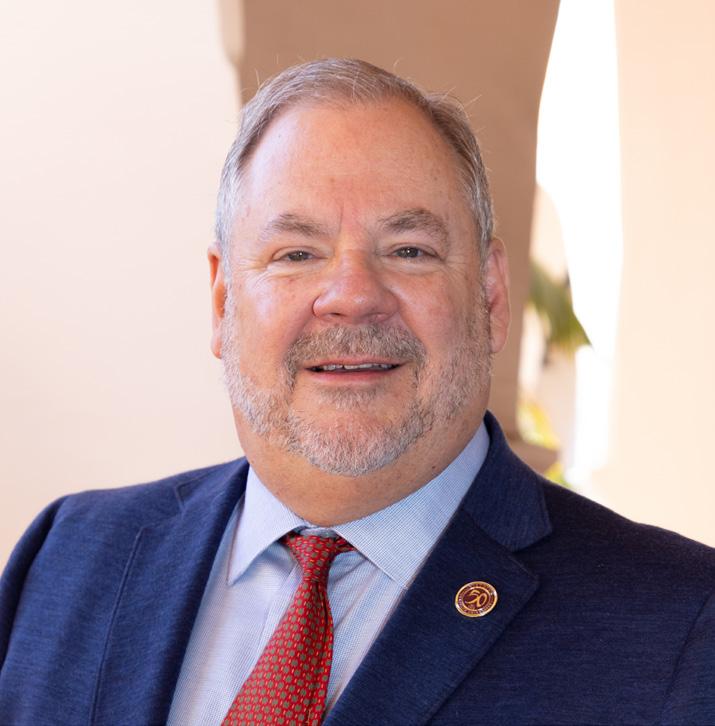
FIELDING GRADUATE UNIVERSITY WAS FOUNDED IN MARCH OF 1974 IN SANTA BARBARA, CA.
DEMOGRAPHICS
UNIVERSITY for the Working Professional
ENROLLMENT 940 Students
DEMOGRAPHIC
80% Women. 20% Men.
AGE RANGE 21 – 84
Student-Faculty Ratio 9:1
American Indian or Alaska Native Asian Black or Af rican American Hawaiian or Pacific Islander Hispanic or Latino White Two or More Races Race/Ethnicity Unknown Non-resident Alien International Students
Aggregated data based on Fall 2023 census data as reported to Integrated Postsecondary Education Data System (IPEDS). 1 Grouped together in IPEDS as Race/Ethnicity Unknown
Fielding’s administrative offices are located in two lot-adjacent office buildings in beautiful Santa Barbara, California. To enrich your educational experience, many of Fielding’s programs hold face-to-face events throughout the year in different regional locations. Our Academic Conferencing & Events Department contracts with hotels and other educational spaces such as retreat centers to provide suitable spaces for your learning and engagement with faculty.

For the last 12 years, a familiar face has been at the helm of Fielding Graduate University. You would be hard-pressed to not find President Katrina S. Rogers, PhD, at myriad Fielding events, from community gatherings at Global Sessions, to graduations, donor trips, virtual gatherings, and annual staff events.
At the end of January 2025, our Fielding community will experience change when President Rogers retires, leaving a legacy that will continue to propel Fielding forward. Although she is leaving her presidential role, President Rogers will return to the Human and Organizational Development faculty, reinvigorating her scholarly pursuits. Change is inevitable, and while we will miss President Rogers’ caring, strategic leadership, this change also brings new opportunities for growth and innovation.
We sat down with President Rogers to talk about the state of higher education, milestones during her presidency, and what’s next for Fielding’s longest-serving president.
Q: What do you foresee as some of the most pressing challenges facing higher education today?
KR: There are financial challenges related to declining enrollment and fewer graduate applications across the country. It has happened because people don’t understand how critical the social and behavioral sciences are. They don’t see the overall importance of these professions in a healthy and well-functioning society. All higher education is under threat from certain segments of our society who lack this awareness and are attempting to undermine graduate education.
When we see threats and assaults on academic freedom on other campuses, especially public institutions around the country, it also means we are under threat. Dr. Martin Luther King said, “Injustice

anywhere is a threat to justice everywhere.” This sentiment resonates deeply in our current context. I am deeply troubled by the ongoing struggle to defend and promote the value of graduate education in the social and behavioral sciences — a challenge that has been a central theme in my work these last years as president of Fielding.
Q: You have achieved so many vital milestones during your presidency. When you reflect on them, what are you the proudest of?
KR: I’m proudest of the achievements that benefit the greatest number of people, particularly our students, alumni, faculty, and staff. We were able, for example, to fund the Dianne Kipnes Library and the Alumni Research Library, which provide added benefits for Fielding graduates that many other graduate institutions do not offer. We have some of the best collections in the country for graduate research in the social and behavioral sciences. We’ve been an important innovator in distributed learning university, and Fielding continues to make significant contributions and commitments that support lifelong learning in our community, I’m also particularly proud of Fielding University Press. I’m delighted that Dr. Jean-Pierre Isbouts created it under my tenure and that we supported this endeavor right from the beginning. Students, faculty, and alums can publish their theoretical ideas and release their cutting-edge research through these quality publications. It does quite well in this day of academic presses, and that is certainly a feat in today’s world and something we can be proud of.
While I was president, we doubled our endowment, allowing Fielding to grow far into the future. We should always invest now to ensure a healthy future. I had hoped to create an endowment large enough to lower our tuition. I got close, but I was not able to
reach that lofty goal, but I still believe that making tuition more affordable for our students will advance our mission of providing quality graduate education in important fields and disciplines.
Q: What have been some of your favorite memories as president – and in other roles at Fielding?
KR: Some of the most memorable moments throughout my time at Fielding have happened at New Student Orientations because students are just starting their Fielding journey. They may be a little nervous, but they are excited and engaged. I also have fond memories of student dissertation committee meetings. I think it’s where the magic happens. The faculty’s expertise and emotional support help students grow their own potential. I’ve loved attending Global Sessions with our students, just sitting in the lobby of the places where we have gathered. You can feel the positive energy and goodwill from the community in meetings and so many other spaces. I’ve witnessed happiness in so many different settings. Personally, I’m always happiest
about graduation. Any educator loves to see graduation, because that’s what we are here for. I love graduation music and always enjoyed speaking and watching students walk across the stage. That’s just everything. It makes it all worthwhile.
Q: What advice would you give to the next Fielding president, and what do you hope is part of your legacy?
KR: I think the next president should create a strong, new vision, collaborate with others to implement that vision, and take the time to listen. There are a lot of things happening at Fielding. I encourage the next president to not underestimate our complexity, our strengths, and our unique character. I hope that this past decade will be seen as a time of tremendous change for Fielding, and that we emerge from that change transformed. We can evolve who we are and retain our essential self as lifelong learners in the graduate space and the social and behavioral sciences. We can also deepen our understanding of what that means — and remain unique and strong in our sense of self going forward. That’s what I hope is my legacy.
Doubling the university’s endowment funds, demonstrating her exceptional financial stewardship
Securing the largest philanthropic gifts in Fielding’s history, significantly enhancing resources for the library and scholarships
Expanding academic programs, including the introduction of a doctorate in infant and early childhood development, a significant achievement for the institution
Establishing the university’s first vice president for diversity, equity, and inclusion, underscoring Fielding’s commitment to fostering an inclusive environment
Successfully navigating the challenges posed by the COVID-19 pandemic, demonstrating resilience and strategic leadership
Establishing the Fielding University Press and the Fielding Travel Program to support lifelong learning and alumni engagement across the globe
B. DENISE HAWKINS
The Fielding community experienced memorable firsts as members gathered in Washington, D.C., July 7–13, for the 2024 Global Session, graduation, and convocation.
Fielding faculty, students, alums, and staff met in person for the weeklong Global Session and to jointly celebrate the newest master’s and doctoral graduates from the School of Leadership Studies and the School of Psychology. During convocation, each graduate speaks about their Fielding experience and what earning the degree has meant to them.
“Our ceremonies are not merely about crossing a stage, but an acknowledgment of the support the graduate received to accomplish their goal and the transformational journey it entailed,” said Fielding President Katrina S. Rogers, PhD.
These ceremonies and sessions, which drew nearly 500 participants during the week, were hosted for the first time on the University of the District of Columbia’s (UDC) campus. Since 2021, Fielding has operated an administrative office at UDC, the city’s only public, historically Black and land-grant university. The campus is also home to Fielding’s Marie Fielder Center for Democracy, Leadership, and Education.
Fielding’s presence on the urban UDC campus is “the legacy of Dr. Orlando Taylor,” said Elena Nicklasson, Vice President of University Relations. “Because of him,” Nicklasson added, “we call it our second headquarters. Dr. Taylor was the one who helped us engage and build this partnership with UDC. Today, Provost Wendi Williams is helping to advance it to the next level.”
Dr. Taylor, who passed away in January 2024, served as Distinguished Senior Advisor to the president and founded the Marie Fielder Center. During the Global Session, “it was wonderful to have so many Fielding folks in town and on the campus, especially as we start to build relationships at UDC, among faculty, students, and staff,” said Katherine McGraw, PhD, Associate Provost for Research, Extramural Funding, and Faculty Development and Director of the Marie Fielder Center. By having a “second headquarters on the East Coast,” added McGraw,
Fielding and its community of learners “can benefit from all that a location and presence in D.C. has to offer, whether its exposure to policy issues, learning and cultural opportunities, international experiences, and so much more.”
The packed week of sessions and celebrations leading up to graduation kicked off with the film premiere of “The Voices of Fielding.” Provost Wendi Williams, PhD, who hosted the wellattended screening and a reception that followed, said the film “beautifully captures the essence of our university and the profound stories of those who have been touched by its transformative power.” As Fielding marks its 50th year, the film, Provost Williams said, captures “the spirit of Fielding, a community that thrives on diversity, inclusivity, and pursuit of knowledge.”
The 22-minute film, which is based on the 254-page Fielding monograph, The Transformative Power of Learning: 50 Years of Lifelong Learning at Fielding Graduate University, features graduates from the Navajo Nation, representatives from the Black Student Association, and a broad cross-section of students and alums from all schools at Fielding. What emerged from the diversity of stories and experiences the film portrayed, President Rogers said, “was a shared aspiration for education and a dedication to completing it.” A brief film discussion with President Rogers and Elena Nicklasson, followed the screening.
Jean-Pierre Isbouts, DLitt, Fielding University Press editor and Faculty Emeritus. of the School of Leadership Studies, coproduced “The Voices of Fielding.” He is also co-editor of the monograph with Nicklasson.
In classrooms and spaces throughout the UDC Student Center and adjoining campus buildings, students, alums, and others pursued opportunities for experiential, in-person learning, completed face-to-face components of clinical and research courses, focused on concentration offerings, and took time to gather with faculty and peers. Poster sessions were prominently on display in the main hall of the UDC student center, the hub of most Fielding activities during the week. The Global Session also offered a host of workshops, training, and seminars, a designated community






space to work on writing, and time to meet with academic advisors and to participate in climate listening sessions. But, there was also time to celebrate and gather with each other. On July 9, President Rogers hosted a lively Community Welcome Reception. The gathering drew alumni scholars, faculty, and staff who enjoyed food, music, and a showcase of student organizations and research poster presentations — all in one place. The busy Global Session offered attendees wellness activities and calming spaces “to slow down, reflect on their day, and rest,” said



Cherjanét Lenzy, PhD, Fielding’s Associate Provost for Student Life and Thriving. Inside the tranquil, sun-filled Well-Being Room, floor mats and colorful, comfy cushions were ideal for meditation, prayer, journaling, and yoga practice.
“We also offered an hour-long, immersive, and therapeutic sound bath experience,” Dr. Lenzy said. During the group session, Dante Baker, a healing practitioner, took participants on a meditative and stress-relieving journey, using singing bowls and overtones from his voice to create waves of soothing vibrations.
B. DENISE HAWKINS
Fielding Graduate University honored educational innovator, inclusion advocate, and visionary leader Ronald Mason Jr., JD, with the 2024 Marie Fielder Medal for Social Transformation. The award ceremony was hosted at the University of the District of Columbia (UDC) in July, which is home to Fielding’s East Coast headquarters and the Marie Fielding Center for Democracy, Leadership, and Social Innovation.
Mason is the former president of UDC, the only public university in the nation’s capital and the only exclusively urban land-grant institution in the United States. He began his tenure at UDC in 2015 and was the university’s ninth and longest-serving president, stepping down in 2023. The university is Mason’s third presidential appointment.
While at the helm of UDC, Mason partnered with Fielding’s President Katrina S. Rogers, PhD, to offer the UDCFielding Urban Leadership and Entrepreneurship doctoral program, which launched in 2019. While the leadership studies and urban studies fields have made significant strides in recent decades, they have been mostly male-centric, whitedominated, and limited to narrowly focused topics like urban transportation, education, and planning. The partnered urban leadership and entrepreneurship doctoral program at UDCFielding, however, is producing a new generation of scholars and practitioners. Its first cohort graduated in 2023.
“I am humbled to receive this year’s Marie Fielder Medal. It’s a prestigious honor,” said Mason, who recalled previous awardees and those in the Fielding community “who

believed in a moral universe and made it their responsibility to fight for justice both inside and outside of the academy.”
He counted the late Orlando L. Taylor, PhD, the inaugural director of the Marie Fielder Center, and President Rogers among them. “I am grateful that my contribution to the cause allows me to be counted among their number.”
The Marie Fielder Medal for Social Transformation is an annual signature award bestowed by the Marie Fielder Center for Democracy, Leadership, and Social Innovation. This award recognizes an individual for a lifetime of achievements devoted to efforts supporting educational access and success.
“We were honored to have President Mason accept the Fielder Medal in recognition of his career devoted to HBCUs and their students,” said Katherine McGraw, PhD, Associate Provost for Research, Extramural Funding, and Faculty Development and Director of the Marie Fielder Center. “His leadership at Jackson State University and the University of the District of Columbia has ensured opportunities for countless African American students to access and thrive in higher education. Nothing could be more

appropriate to the mission of the Marie Fielder Center to advance social and educational justice and inclusion.”
Past recipients of the Marie Fielder Medal for Social Transformation include Dr. Orlando L. Taylor, who served as the Distinguished Senior Advisor to Fielding’s president and the former executive director of the National Science Foundation-funded Center for the Advancement of STEM Leadership until his death in January 2024; Dr. Walter Bumphus, president of the American Association for Community Colleges; Dr. Gary Orfield, co-director of the Civil Rights Project at UCLA; Dr. Patricia Gurin, the Nancy Cantor Distinguished University Professor Emerita of Psychology and Women’s Studies at the University of Michigan; American labor leader Dolores Huerta; and Professor Angela Davis, social justice activist, writer, and scholar.

I am deeply grateful for the generous support provided through the Dr. Sherry L. Hatcher Honorary Scholarship. As a Hispanic woman and the first in my family to pursue a PhD, this scholarship means more than just financial assistance — it represents an important milestone in my personal and academic journey. Working full-time while attending Fielding Graduate University and paying for everything myself has been a challenge, but this scholarship allows me to focus more on my dissertation, which explores the critical issue of belonging. Your belief in my work empowers me to delve deeper into this important topic and inspires me to contribute valuable insights that can make a meaningful impact in the field. Thank you for your investment in my research and for supporting my path toward making a difference.
Laura Ligouri, Clinical Psychology doctoral student

Fielding alumni, faculty, students, and staff traveled to Morocco in September 2024, spending time in Fes and Marrakesh. Thanks to the generosity of Fielding alum Pauline J. Albert, PhD (’09), the endowment honors Faculty Emeritus. Jean-Pierre Isbouts, DLitt, and supports lifelong learning.
Fielding will be traveling to Holland in 2025 and France in 2026.
What is the history of Fielding University Press, and how did the idea come to be?
Until recently, the idea that a small, specialized university like Fielding could have its own dedicated press was unthinkable. Traditional forms of print publishing are woefully expensive and only cost-effective with print runs of at least 2,500 copies or more. And when those copies are printed, they have to be stored at a major distribution center — such as Ingram’s — ready to be shipped by truck to bookstores and libraries across the country and around the world. Needless to say, the associated costs of transportation, storing, and shelving are steep, not to speak of the carbon footprint involved. This is why university presses have always been associated with large universities that can afford to maintain them.
What changed was the digital revolution. Just as streaming music laid waste to the music CD business and streaming video all but obliterated the DVD rental industry, the development of digital print-on-demand technology radically changed the way books are produced, published, and sold around the world. In essence, this technology allows a publisher to produce and distribute a book using the just-in-time model: We don’t print a copy unless we know there is a customer who wants it. Therefore, no more need for expensive volume runs, storage space, and laborious logistics. Amazon then merged this technology with an international distribution system that allows a print-on-demand book copy to be delivered directly to the customer without the intervention (and the sales margin) of a retail bookstore. In the case of an electronic book (or e-book) version, the delivery is instantaneous.
Just as this revolution was taking shape, I was involved in several publishing projects that tested the boundaries of the electronic book (or e-book) experience. For a British publisher, we designed a software extension of the EPUB format. Then, working with Apple, we also produced one of the first multimedia e-books with embedded video, shot on location in the Near East, based on my book From Moses to Muhammad: The Shared Origins of the Three Great Faiths.

Jean-Pierre Isbouts, DLitt
Given all of these new publishing models, I wondered in 2013 if Fielding would be interested in developing a university press activity of its own. At that time, I had spent some 10 years teaching in Fielding’s School of Psychology, and I knew the tremendous creativity and depth of the work that our students as well as faculty were producing. I also knew that many of our graduates struggled to get the results of their dissertation published in peer-review journals. In most cases, the problem was not the quality of their findings, but the fact that there were too many PhDs vying for too little space in academic journals.
Serendipitously, this moment coincided with the appointment of Dr. Katrina Rogers as President of Fielding Graduate University. Her arrival brought a wave of fresh ideas to the Fielding C-suite,
particularly in the wake of the Great Recession that had eroded much of the academic landscape. When I presented the idea for an academic press activity, she immediately saw the opportunity to promote Fielding as a leading center of original research — something that few of our competitors in the distributed learning space can claim. The result was a prototype, a monograph called Social Change in the Modern Workplace, edited by Dorothy AggerGupta, PhD, which brought together the results of six student dissertations. Social Change has served as the template for FUP’s publishing process ever since, even though we continue to improve the model in every way possible.
Nonetheless, book publishing is still a labor-intensive effort. Over the years, we have developed a number of techniques for monographs, in which a group of scholars and alumni collaborate on a single publication. Once their manuscript is finished (including a peer review), it is copyedited by one of several copyeditors we engage for this task. Then, the manuscript is turned into a series of layouts, known as galleys, by artists using Adobe InDesign. Another artist designs the cover. Meanwhile, we encourage the author(s) to solicit endorsements from colleagues and scholars in the field that we can include on the book cover and on the Amazon book page. Working with Fielding’s communications department, we then publicize the books using press releases and social media.
How many total publications has FUP produced?
Since its inception, FUP has produced over 40 titles, written not only by our own students, alumni and faculty, but also by over two hundred scholars around the world. For example, our recent book, Higher Education in a Changing World, was authored by nearly 50 scholars and leaders from across the spectrum of higher education and was led by the late Dr. Orlando Taylor. Books such as these help to establish Fielding as a leader in original research and carry its name to the far corners of the world. For a smaller graduate institution like Fielding, that is a huge benefit, for it raises its profile far above its competitors in the field of distributed learning.
How has FUP positively impacted Fielding and the world at large? How does it address some of the world’s most pressing issues?
Our titles reflect the disciplines that Fielding teaches, including clinical psychology, media psychology, human and organizational development, and education. Many of our earlier monographs, written by our faculty with students and alumni, also addressed pressing issues such as sustainability and mental health. Dr. Barbara Mink spearheaded a monograph on The Future of Navajo Education, which sold extremely well. We now have a second volume in development. Another important book, Colorism: Investigating a Global Phenomenon, coincided with the rise of the Black Lives Matter movement and was written by 45 scholars at
more than 15 American colleges and universities and was led by Dr. Kamilah Woodson. Another successful string of books are focused on evidence-based coaching, which is a very prominent discipline at Fielding. Innovations in Leadership Coaching, led by Dr. Terry Hildebrandt, is one of our evergreen titles, as is Leadership Coaching in China, which has since been translated into Mandarin. As a result, our books are sold not only in the United States but all over the world, most notably in Canada, the United Kingdom, the European Union, Australia, and Japan.
In 2022, Fielding alum Dr. Pauline Albert founded the Endowment for Lifelong Learning, part of which enables us to co-fund the publication of dissertations by our alums as autographs. This is a relatively new development but one with tremendous promise. Examples are The Sexual Misconduct Guidebook by Dr. Laura Jean McGuire, Struggling with Infertility by Dr. Sharon Schönteich, and Parents and Teachers by Dr. Andrés Versage, published just this past year. These books have broadened the scope of our publications by connecting with immediate issues and topics in our modern society, particularly since the research is so recent. We have a number of new alum titles in development, each of which holds tremendous promise for the future, in addition to our ongoing slate of new monographs.
What does FUP mean to you personally?
I have been writing books for much of my career as a scholar, including a number of hardcovers for National Geographic, Sterling Publishing, St. Martin’s Press, Bertelsmann, Polistampa, and Apollo Publishing. That is what inspired me to initiate Fielding University Press, and that is the experience that I try to share with our authors, particularly our students and alums. I have given a number of seminars on what it takes to turn a dissertation into a book for a mainstream reader, and I hope to continue to do so in the future. The most important takeaway is that a book is not a dissertation. It must be written afresh as a compelling story, using the research from the dissertation as its primary data, augmented by the context of movements and ideas in modern society. That takes some work, both from the author and from me as editor, but in the end such a book can offer a tremendous opportunity for our graduates to launch their scholarly career. And that is an opportunity that few universities, both large and small, can provide their students today.
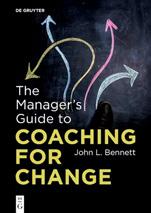
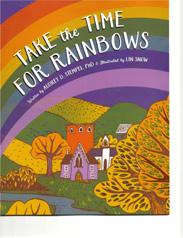

John L. Bennett, PhD (Human and Organizational Systems, ‘06), authored The Manager’s Guide to Coaching for Change (De Gruyter, 2024).
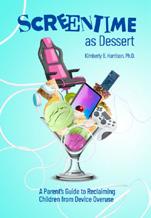
Audrey Stempel, PhD (Clinical Psychology, ‘06), authored the children’s book, Take the Time for Rainbows (Maine Authors Publishing, 2024).

Flavio Mesquita de Silva, PhD (Human and Organizational Systems, ‘17), authored a chapter in Humberto Maturana: Reflections on Bringing Forth Worlds (Imprint Academic, 2023).

In October, Fielding representatives, including Provost Wendi Williams, PhD, and EBC and ODL Program Director Okokon Udo, PhD, traveled to Shanghai to speak with Keystone Evidence Based Coaching program alumni about how coaches can drive change through personal transformation. They shared insights on navigating our VUCA world and the vital role coaches play in supporting growth and resilience.

Kimberly B. Harrison, PhD (Clinical Psychology, ‘15), authored Screentime as Dessert: Reclaiming Children from Device Overload (self-published, 2024).
Robert Barner, PhD (Human and Organizational Systems, ‘03), authored Shadow: A Paranormal Suspense Thriller (self-published, 2024).
Bruce Pace, PhD (Clinical Psychology, ‘02), authored Moments Out of Time (self-published, 2022).
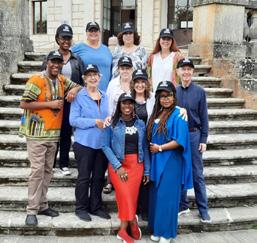
In September, President Rogers delivered the opening day keynote speech at the International Transformative Learning Conference (ITLC) at the University of Siena, Italy. Her presentation centered on “From Disorientation to Reorientation: How Transformative Learning Can Energize Global Environmental Solutions.” Additionally, 13 students, alumni, and administrators attended ITLC.

Fielding students, faculty, and staff participated in the 2024 American Psychological Association (APA) Convention from Aug. 8–10 in Seattle, WA. Provost Wendi Williams, PhD, also hosted a Fielding Social Hour on Aug. 9 at Alder and Ash.

Fielding proudly participated in the Pacific Pride Festival in Santa Barbara in August, celebrating love, inclusion, and community. We are honored to support this event every year. This is a celebration for every generation and every identity within the LGBTQIA+ community and allies. It honors the past, embraces the present, and inspires the future, recognizing the rich diversity and intersecting identities that make the Santa Barbara community vibrant and strong.

Lauren Mizock, PhD, core Clinical Psychology faculty, was named the Ruthellen Josselson Chair in Qualitative Inquiry for 2024-25. The Josselson Chair is appointed for one academic year, September-August, and Dr. Mizock began her tenure in September 2024.


New Leadership Roles
Announced
Kathy Geller, PhD, has been appointed as Dean of the Faculty. In this role, she will provide leadership and strategic direction to support the experience of Fielding faculty across the professional life cycle, fostering a vibrant academic community that promotes excellence in faculty teaching, scholarly work, and service.
Kristine Jacquin, PhD, has been appointed as Dean of Curriculum and Innovation. Her responsibilities will include driving the development of innovative curricula, integrating emerging technologies into the learning experience, and enhancing the overall academic quality and relevance of Fielding’s programs.
Other new appointments include:
• Okokon Udo, PhD, Program Director, Evidence Based Coaching (EBC) Certificate and Master’s in Organization Development Leadership (ODL)
• Patrice Rosenthal, PhD, Human and Organization Development (HOD) Interim Program Director
• Jonathan Iris-Wilbanks, MA, Program Director/Lead for new Infant and Early Childhood Development Master’s Program

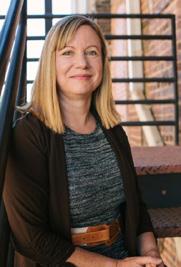
Media
Psychology
Faculty
Published in Psychology of Popular Media
Two Media Psychology faculty members published in the peer-reviewed journal, Psychology of Popular Media, with the paper, “Qualitative and Quantitative Investigations of Office Fans’ Connections with Fictional and Celebrity Couples: Identification, Parasocial Relationships, and Beyond.” Dr. Perry Reed, associate faculty at Fielding, is the first author of the paper, which is about identification and parasocial relationships with fictional and celebrity couples. Dr. Reed collaborated with fellow authors Drs. Karen Shackleford (Media Psychology core faculty), J. David Cohen, and M.J. Robbins.

Sharon Schönteich, PhD
Struggling with Infertility by Dr. Sharon Schönteich is an attempt to shed a beam of light onto the struggles of those who experience infertility and the consequences of these struggles. Having a baby and becoming a parent are major developmental milestones in adulthood that most people aspire to achieve. It is typically expected that pregnancy should happen naturally and seamlessly. However, when pregnancy is not achieved as expected, it usually comes as a shock. One in eight people has struggled with infertility, making it sad that it is not spoken about more broadly. Persistent attempts without success often
lead to feelings of loss or failure. Over time, living in a world surrounded by those who are pregnant, who are parents with children and amidst families, becomes painful for those who do not have what others have and what they wish to have for themselves. Unfortunately, infertility is not openly talked about. Like many other health-related topics, it impacts people intimately, and as a result, it remains invisible. There is little literature available for a general audience that helps shed light on infertility and the experiences of those who endure it. This book aims to address that.

Andrés J. Versage, PhD
A positive engagement between parents and teachers has been proven to improve student performance, but today, that relationship is increasingly under pressure from social and political tensions. Topics such as LGBTQ+ issues, critical race theory, remote learning, and book bans have made this engagement more important than ever. In response, Andrés Versage, a school principal and doctoral graduate of Fielding Graduate University, uses a variety of fascinating, real-life case studies to show how we can turn this relationship into an alliance that creates more caring and effective schools.
In facing the challenges of the moment, this book shares a number of practical, positive steps that each of us can take to make our schools and our society more harmonious. In doing so, Versage argues that the transformation of the parent/ teacher engagement through a community-centered approach can save public education from the havoc of our culture wars, no matter where we live.
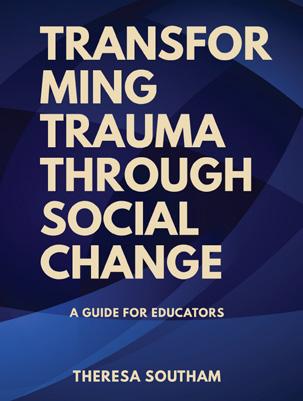
Theresa Southam, PhD
Transforming Trauma through Social Change is a practical guide for educators and trainers to guide students in the understanding of trauma and working towards wellness through justice and examples of social change. In doing so, the author reveals the depths and complexity of oppression and inequity and illustrates how communities make meaning from trauma. The book explores key concepts within trauma theory, such as grief, acknowledgment, forgiveness, giving, transformation, and cultures of resistance through the living
histories of individuals and communities. Dr. Southam also writes about the oppression and the persecution of the Doukhobors, the internment of Japanese Canadians, the hostility toward asylum seekers and new immigrants, and the isolation of older adults. The book argues that feeling empowered to change society is critical in these challenging times. Southam does so by applying theories like the sense of coherence, redemptive sequencing, and creating radical imaginaries.
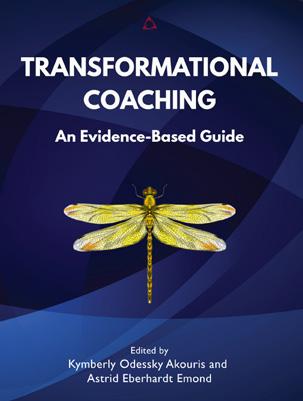
Kymberly O. Akouris and Astrid E. Emond
Transformational Coaching studies the intersection of human and organizational development for coaches, highlighting transformative opportunities that can lead to positive changes in outlook and behavior. The authors put the discipline of coaching in the context of the range of challenges that individuals and organizations are facing in a time of rapid and unsettling change. Thoughtful coaches understand that transformation requires that we look both inside ourselves and outside to the greater
world. Moving from scholarship to the practical application of the knowledge gained from this book, transformational coaching is not just about personal development but about the development of capacities that are going to be put at the service of the problems of our time. This book is a call to all coaches, teachers, and leaders to use the transformational power of coaching in the service of bettering individual life and bringing about enormous collective change in the world.
Earlier this year, the Clinical Psychology Diversity, Equity, and Inclusion (DEI) Committee chose its 2024 DEI Award recipients: Nathan Smith, a Clinical Psychology PhD student, and Lauren Mizock, PhD, Clinical Psychology core faculty. This award recognizes the contributions students and faculty make to advance DEI work. We asked this year’s recipients about their DEI work and what this award means to them.

Nathan Smith: I feel seen and heard. Receiving the Clinical Psychology program’s DEI student award means the world to me and affirms my passion for working with racial and ethnic minority groups. There are few Black male clinical psychology doctoral students and clinical psychologists, so representation matters. I have been committed to ensuring DEI remains at the forefront of my clinical training, research, and involvement in the Fielding community since 2020. One of my proudest contributions to DEI at Fielding is working with phenomenal colleagues in the Black Student Association since 2020. We have consistently offered a safe space for Black students and faculty.

Lauren Mizock, PhD: I feel a sense of great honor and meaning to be acknowledged by colleagues and students for working on DEI matters in our program. I experience racial privilege and other unearned advantages as a White woman in this world. I hope to use my privilege for power to help center DEI work in clinical psychology and contribute to positive change, though with caution around centering myself.


Fielding Clinical Psychology faculty member Alayne “Mimi” Ormerod, PhD, and doctoral student Tiffany Parisi, MPH, are the recipients of the 2024 Dr. Sally Peterson Research Excellence Award for their research published in the Journal of Social Issues about how schools that have climates that are tolerant of sexual harassment also tend to foster a loss of safety and academic disengagement for high school girls, particularly through peer sexual harassment. This is the kind of research that is critical for our understanding of how to change school climate to provide a better learning environment for all.
Research Publication
Ormerod, A. J., Parisi, T., DeBlaere, C., & Sagrestano, L. M. (2023). School climate tolerant of sexual harassment is indirectly related to academic disengagement through peer sexual harassment and feeling safe in high school girls. Journal of Social Issues, 79(4), 1231–1250. https://doi.org/10.1111/josi.12528
You started your Fielding journey as a student and are now associate faculty. What has that journey been like for you?
My journey at Fielding has been truly transformative. It has consistently pushed me out of my comfort zone in the best ways possible. I’ve had the opportunity to attend neuromarketing masterclasses, write myself into a comic book, enter the gun control debate, produce a 20-minute film to explain the neuroscience of narratives, publish research on fan involvement with The Office, and much, much more.
I’ve experienced firsthand how Fielding offers a unique environment for pursuing higher education while balancing a career and personal life. Starting as a certificate student, I initially committed to just three graduate courses. But that commitment quickly grew. I became a master’s student, then a doctoral student, a visiting scholar, and, now, associate faculty. Returning to Fielding after adjunct teaching at two other universities feels like coming home to a community that values interdisciplinary exploration and supports continuous personal and professional growth.
What are your areas of expertise, and how do those focuses correlate with Fielding’s mission and the Media Psychology program?
In my industry experience, I have taken on leadership roles focusing on marketing, communications, education, and UX design. My most memorable role was developing digital campaigns to improve patient outcomes for thousands of community pharmacies. Additionally, my decade-long volunteer work with the American Cancer Society allowed me to build my skills in audience engagement and leadership training for fundraising programs at the national and global levels.
These areas of expertise are highly relevant to the academic focuses of the Media Psychology program. Effective brand storytelling, audience engagement, product design, online learning, and persuasive communication all stem from understanding the interactions between people and media technologies. Success depends on continuous research — market analysis, big data, focus groups, interviews, surveys, journey mapping, UI prototype testing — to uncover human-centered insights and drive business strategies.
Aligned with the Fielding mission, my focus areas are essential for fostering a learner-centered environment that values students’ experiences while equipping them with new skills and perspectives. I have always employed an interdisciplinary approach to transform curiosity and hunches into evidence-based insights.
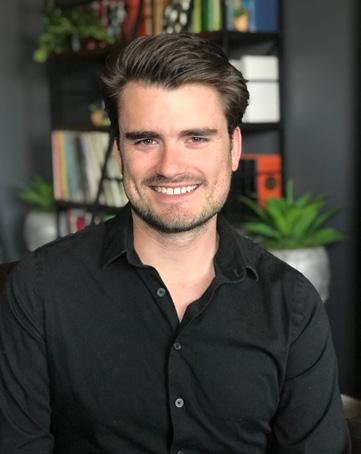
How are you still implementing your dissertation work in your scholarship and practice?
My dissertation research investigated how people engage with AI-generated stories and evaluate their creativity. Contrary to my original hypotheses, awareness of AI authorship did not reduce participants’ narrative engagement or creativity evaluations. These findings held consistent across U.S. adult participant demographics of age, gender, education, and income levels.
When I formulated my research question, I often had to explain what generative AI was and what it could do. By the time of my final oral review, generative AI had become a mainstream topic — especially at home in Los Angeles amid the writers’ and actors’ strikes, which highlighted concerns over AI’s role in the entertainment industry.
As a scholar, I am designing follow-up studies to better understand individual and situational factors that may shape how individuals engage with and evaluate the outputs of generative AI. As a consultant, I apply the core principles of my research to guide organizations on effectively leveraging AI and communicating its use transparently and responsibly.
Furthermore, my findings reinforce the ever-growing importance of media literacy, particularly in the age of generative AI. Rather than investigating whether AI can truly be creative, my research focuses on the “Lovelace Effect” — people’s perceptions of creativity in machines. I see a critical need for education that helps people understand how generative AI operates, emphasizing that its outputs are rooted in vast amounts of human-created content and shaped by humanguided machine learning algorithms. I am pursuing paths to bring this type of generative AI literacy to the public.
Where do you see the field of media psychology in five years? Ten years and beyond?
Media psychology is timelier and more relevant than ever. Technology is shaping nearly every aspect of modern life, with AI takes on roles that we previously assumed would only be for humans (and perhaps still should be). It’s about more than just specific tools; it’s about expanding how we understand ourselves and relate to each other.
In the next five years, I envision the field expanding through continued collaborations with other branches of psychology, such as neuro, cognitive, and clinical psychology, to address complex issues like online behavior, misinformation, and digital well-being.
Today, when I explain to someone just what media psychology is, I see their initial looks of confusion shift into an “aha” moment as they say “Ooh…we really need that.” As awareness of the field grows, I see media psychologists being proactively called upon to help shape policies, advise industry, and promote media literacy. This expanded influence will help society navigate our increasingly digital and interconnected world with a more critical, informed perspective.
What has been the most fulfilling aspect of being part of the Fielding community?
As a member of the Fielding community, I deeply appreciate the rich diversity of academic backgrounds and industry experiences represented by our students, faculty, and staff. Reflecting on my journey from student to associate faculty, I can’t even begin to count the number of discussion forums I’ve participated in, but I can tell you this: Every discussion has been marked by respect and enriched with academic theories and evidence, prompting me to continually reflect on my own perspectives. I am also proud of Fielding’s commitment to social justice and the way it is interwoven into our programs, our curriculums, and our interactions with each other.
Fielding and its partners hosted the 8th Annual Navajo Education Conference in June 2024 at the Navajo Nation Museum in Window Rock, Arizona. This annual conference is a joint effort between Fielding Graduate University, the Navajo Nation, the Navajo Nation Department of Diné Education, the Office of Navajo Scholarship and Financial Assistance, and the Navajo Nation Teacher Education Consortium.
Doctoral scholar-practitioners in the Educational Leadership and Change program took the stage at a commencement ceremony. More than 100 family, friends, and relatives attended the commencement ceremony and the after-ceremony reception hosted by Fielding.
Congratulations to these graduates:
• Jason Arviso, EdD, Tribal and Business Leaders Perceptions of the Use of Broadband Internet Services in the Navajo Nation
• Delphina Joe-Dayish, EdD, Navajo Grandparents Raising Their Grandchildren: Their Strengths, Challenges, and Needs
• Maxine Sloan, EdD, Using the Navajo Concept of Taa H Ajit’eego Teiya, Ya’at Eehgo Ji Nahleh (Your Success in Life is Your Personal Responsibility) in the Design of a Financial Literacy Curriculum for Fourth Grade Students
At the ceremony, Dr. Jennifer Edwards, School of Leadership faculty emerita, was also presented with an Award of Appreciation in recognition of her dedicated work with Navajo educators.
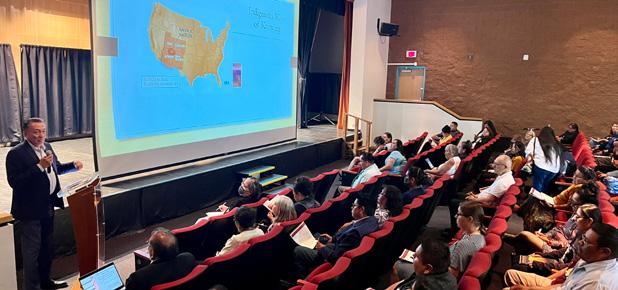


As the program director, words can sometimes fall short of really capturing all that the Fielding Infant and Early Childhood Development (IECD) programs stand for and embrace. Regarding the PhD program, for me both personally and professionally, there is no greater joy than to have been on the journey with our students from their start to their finish. The transformation that occurs between what we anticipate when starting a doctoral program and the end of the program shows up strongly during students’ final oral reviews (FORs).
I would love to take a moment to highlight both the interprofessional as well as international space of our PhD program by introducing you to two of our most recent students both from their country of origin and through their remarkable research. Charmaine Tidmarsh represents our occupational therapy (OT) practice and Kamelia Slankard represents our speech-language pathology (SLP) colleagues. The IECD PhD program stands out as the only doctoral program in the world that offers an interprofessional doctoral degree in Infant and Early Childhood Mental Health and Developmental Differences. Charmaine and Kamelia represent the beautiful cross-cultural and cross-disciplinary perspective-taking throughout this program.
Jenene Craig, PhD, IECD Program Director
Pursuing a doctorate degree was always on my life’s to-do list and a notion I entertained regularly as a speech-language pathologist. Most of my career experience has been in diagnosing and treating developmental speech and language delays and disorders in early intervention settings. Before deciding on Fielding Graduate University, I considered several avenues to a doctoral degree. I was interested in a well-rounded program that integrated theoretical knowledge, research and flexible clinical practice (e.g., outpatient, public school, private practice). The IECD program’s sole focus on infant and early childhood is rare among academic programs, and the developmental, individual differences, and relationshipbased (DIR) concentration adds an invaluable professional reach.
Throughout the last three years in the IECD program, I have benefitted from the flawless blend of academia and practice. In this program, I was introduced to many new psychological and
developmental theories not part of my academic repertoire as a speech pathologist. The program enabled me to bridge scholarship and clinical implementation, resulting in a sum greater than its parts. The focus on transdisciplinary collaboration and the incorporation of newly learned theoretical understandings into daily interactions with families and their children has elevated my awareness as an SLP and allowed me to serve my community better.
As I look ahead, I hope to expand my professional experience to include teaching in a higher education setting. Reaching the next generation of early interventionists would be an enormous responsibility but, ultimately, a way to pay it forward. I am so grateful to Fielding for the opportunity to grow as an individual by learning to think differently and as a professional by learning to behave differently.
Kamelia Slankard, IECD Student
I was particularly drawn to Fielding because of its flexibility, which allows me to balance work and study. As a working professional, having an online program was crucial in enabling me to continue my career while pursuing further education.
More than that, the IECD program offered the perfect blend of evidence-based research and practical application, which aligns closely with my passion for early childhood development. The ability to apply what I learn directly to the challenges faced by these children was a major factor in my decision.
The IECD program excels at bridging the gap between theory and practice, significantly enhancing my professional development. The rigorous and research-driven coursework provides a strong foundation in developmental science while allowing me to explore practical applications in real-world settings. Our virtual sessions, where faculty and colleagues share their expertise, foster valuable cross-learning opportunities. The program’s structure encourages critical thinking, enabling me to assess situations from multiple perspectives and develop innovative approaches grounded in solid research.
After graduating, I aim to raise awareness about the importance of every child growing up in a loving family environment. While


institutional or out-of-home care may sometimes be necessary, it should always be temporary. Every child deserves the stability and nurturing that only a family can provide. To achieve this, I plan to share my insights and focus on influencing key stakeholders — particularly policymakers, the Social Welfare Department, the Education Bureau, healthcare authorities, and peer agencies in Hong Kong.
A holistic approach requires support for the children, their parents, and significant others. While children are in out-ofhome care, we must emphasize the importance of nurturing care, addressing developmental needs, and ensuring that early intervention services are timely and of high quality. Public awareness is equally crucial, as societal support can drive meaningful change in how we view and manage out-of-home care. Through my learnings at Fielding, I also aim to develop evidence-based programs and early interventions in Hong Kong that can support infants prenatally exposed to substances and in institutional care.
Fielding has been so much more than just a place to study — it’s become a community that has supported and inspired me every step of the way. I feel incredibly fortunate to have my agency in Hong Kong cheering me on, along with professors who not only teach but genuinely care about my progress. They’re always there when I need extra help or guidance, and their encouragement has made a difference. Even though we meet virtually, I’ve built strong, lasting friendships with my peers and professors — something I did not expect but deeply value and respect.
The program is structured in a way that allows me to truly immerse myself in the material without feeling overwhelmed, and the flexibility has made it possible to balance my job with my studies. It’s certainly not easy and requires a lot of self-discipline, but the support from the staff, librarians, and faculty has been incredible. Their help has been key in keeping me on track toward achieving my goal of earning a PhD. What sets Fielding apart is its commitment to and celebration of inclusion and diversity. These values are very close to my heart, and being part of a program that embodies them has been deeply meaningful. Fielding has given me academic confidence and transformed how I think and approach my work, particularly in supporting children’s well-being.
Charmaine Tidmarsh, IECD Student
Clinical Psychology alum Dr. Kimberly (Kymn) Harrison and current Clinical Psychology doctoral student Katherine (Katie) Chapman have more in common than just a shared passion for psychology. They are a mother-daughter duo who have both studied at Fielding along individual paths leading to professional and personal synergies.
Dr. Harrison completed her PhD from Fielding in 2015 after transitioning from a diverse career in sales, marketing, and ministry. Driven by compassion and a deep desire to help others, she eventually pursued psychology. Now, she runs her own private practice, The Conative Group, where she specializes in psychological assessments, a passion she discovered along her educational journey. She also engages in research and speaking engagements.
Katie, currently in her fifth year of the Clinical Psychology PhD program, followed in her mother’s footsteps in a unique way. With a background in vocal performance and ethnomusicology, Katie initially found her interest in research through her love for music. However, she later realized her true calling was in clinical psychology, where she could create meaningful change and a portfolio career.
Serendipity led both mother and daughter to Fielding.
“One school told me flat-out that I was ‘too old’ to be considered,” Dr. Harrison said. “I Googled something like, ‘PhD program that takes older people,’ and Fielding came up! My experience with Fielding’s welcoming community and supportive faculty made all the difference. When I met Ray Hawkins, instead of saying, ‘We don’t take people like you,’ he said, ‘Wow, you’re rich with experience. You’d be a great candidate.’”
Both Dr. Harrison and Katie were part of now-retired Clinical Psychology faculty member Ray Hawkins, PhD’s “Hawk’s Nest.” Dr. Hawkins has a profound impact on their scholarship and practice, helping them carve their own paths at Fielding.
“Dr. Harrison was an advisee in my Austin Hawk’s Nest cluster,” said Dr. Hawkins. “She completed the PhD program in clinical psychology in record time — a little over four years. Her PhD dissertation, which I chaired, was a longitudinal study of the effects of mentoring on the adult outcomes of individuals with ADHD. Since her graduation, Dr. Harrison has not only become a licensed psychologist, but she has also created an assessment and treatment clinic for autistic individuals where she supervises Fielding doctoral practicum students and conducts clinical research,
which she has presented at Texas Psychological Association conferences and has published articles and books.”
Katie’s introduction to Fielding came naturally through her mother’s experiences. However, it was her interactions with Dr. Hawkins that also solidified her decision.
“Working with Dr. Hawkins helped me realize my commitment to clinical psychology, and Fielding’s program offered the flexibility I needed,” Katie adds. “Fielding’s emphasis on adult learners and diversity really stood out to me, and I saw how it would give me opportunities to work with a wide range of people and experiences.”
Katie was also part of the Austin Hawk’s Nest cluster.
Dr. Hawkins said, “I also chaired her [Katie’s] recently completed PhD dissertation that explored the relationship between childhood musical experience and adult self-efficacy and social anxiety disorder. Katie is currently completing her doctoral internship. Dr. Harrison and Dr. Chapman have become a dynamic mother-daughter duo, co-presenting seminars at the Texas Psychological Association.”
According to Katie, working with her mother has been a “successful experiment,” with their previous and current collaborations.
Dr. Harrison and Katie have co-authored a chapter, “Fostering Intimacy and Participant Engagement on the Zoom Platform,” in the 2023 publication, The Virtual Group Therapy Circle.
For the two of them, Fielding has provided much more than academic credentials; it has become a family and a lasting support network. They both emphasize the importance of community, lifelong learning, and the legacy they hope to leave through their work.
“Fielding is community to me,” said Katie. “I know that I can go to almost any major city and find someone from Fielding there.”
Dr. Harrison agreed, adding, “The people I connected with 10 years ago are still close friends. We consult, commiserate, and celebrate with each other. It’s a connection that doesn’t fade.”


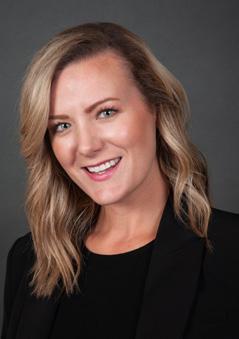
WE ARE GRATEFUL FOR YOUR SUPPORT OF OUR STUDENTS, ALUMS, AND THE UNIVERSITY AS A WHOLE.
The following list reflects all contributions, and pledges received from October 23, 2023 through April 18, 2024. Contact giving@fielding.edu with questions, corrections, or feedback.
Dorothy & NielsAgger-Gupta
Ginette Bedsaul
Autumn Bell
John L. Bennett & Eric T. Johnson
Valerie Malhotra Bentz
Zoe Blalock
Karen S. Bogart & Zac Smith
Alma Boutin-Martinez
Judith Boykin-Mccarthy
Dwayne Brown
Meike Buegler
Joseph & Janet Bush
Joann Canales
Michael Carlisle
Stephen Chiang
Juan Christian
Allison Davis-White Eyes
Caroline Dott
Lawrence Drake II
Zabrina W. Epps
Dino M. Ferrare
Tiffany Field
Luann Fortune
Cynthia & Joel Freeman
Christine Garvey
Kathy D. Geller
Anthony F. Greene
Marc Hanlan
Sharon Hawley-Crum
Stephen Haymes
Mary & Leonard Haynes
Karl F. Hebenstreit
Joyce & Lenneal Henderson
Linda Honold
Kae & Phil Hutchison
Tanya Jones
Kerul L. Kassel
Berit Lakey
Heather Mahardy
Nancy Markle
Barbara A. Mather
Sara Miller McCune
Katherine McGraw
Pamela McLean
Elena I. Nicklasson
Courtney Norris
Thavivanh Phosavath
Marilyn Price-Mitchell
RAC Leadership
Nicole Retland
Leesa M. Riviere
Katrina S. Rogers
Nicole S. Scales Lindberg
Arnold Schaffer
Hon. Harold E. Shabo
Connie & Jay Shafran
Nancy S. Shapiro
C. Reid Spearman
Jimena Terell
Mary Jean Vignone
T’airra Whitis
Bernadette Wilson
We thank those who have generously designated Fielding in their wills or have made a planned gift to ensure Fielding’s future.
Anonymous
Pauline Albert
Natalie Ammarell
Peggy Azad
Nancy Baker
John L. Bennett
Valerie M. Bentz
Dorothy Billington*
Linda & Marvin Branch
Lynn Bursten
Don D. Bushnell*
Christine Clark
Kelly Clark
Anna DiStefano
In honor of Valery M. Bentz, PhD
In honor of Katrina S. Rogers, PhD
In honor of Eleanor Blumenberg’s birthday on December 7, 2024
D’Ann Downey
Nanine Ewing*
Melody Fortenberry
Jeff Frakes
Leola Furman
Kathy D. Geller
Tracy C. Gibbons
John H. Gladfelter*
Michael Goldstein
Sharon Hawley-Crum
Linda Honold
Roberta Jensen
Anne Kratz
Diana Kunkel & Trish Cleary
Sarah N. MacDougall
Paige & Don Marrs
Barbara A. Mather
Charles McClintock & Carol Wilburn
Sara Miller McCune
Pamela S. Meyer
Eileen Morgan
Donald Mroz & Susan Lapine
Christi Olson
Wendy Overend
Marilyn Price-Mitchell
Kathleen Randolph
Katrina S. Rogers
In honor of my parents Jack and Harriett Savage, and in memory of Lila “Peggy” Azad, a Fielding alumna, and dear friend of mine who passed away on April 17, 2024.
• Free Fielding publication annually
• Updates directly from the University Leadership Team
• Invitations to special events at the university
• Recognition opportunities
Rochelle Santopoalo
Nancy & Paul Shaw
Andrea L. Shields
Judith Silverstein
James Skibo*
Nicola Smith
Carol Sommerfield
Ted J. Takamura
Charlotte & Roland* Troike
Pamela Van Dyke
Marjorie J. Woo
Patricia Zell
*Deceased
In memory of Patricia “Trish” Oelrich, PhD In memory of Orlando L. Taylor, PhD
• You are free to alter your plans at any time.
• You can structure your gift in different ways: a specific amount of money, piece of property, or percentage of your estate.
• You retain control over your assets should you need them during your lifetime. Contact Elena Nicklasson, Vice President of University Relations, about how you can make an impact at Fielding through a planned gift: 805.898.2926 or giving@fielding.edu.
DOCTORAL DEGREES
EdD, Leadership for Change
PhD, Human Development
PhD, Organizational Development & Change
Concentrations
Coaching
Community College Leadership for Change
Creative Longevity & Wisdom
Dual Language
Inclusive Leadership for Social Justice
Leadership of Higher Education Systems
Media, Technology, & Innovation
Organizational Development
Somatics, Phenomenology, & Communicative Leadership
Sustainability Leadership
MASTER’S DEGREE
MA, Organization Development & Leadership
CERTIFICATE
Evidence Based Coaching
DOCTORAL DEGREES
PhD, Clinical Psychology
Concentrations
Forensic Psychology
Health Psychology
Neuropsychology
Social Justice & Diversity
PhD, Infant and Early Childhood Development
Concentrations
Developmental, Individual Differences, Relationships (DIR®)
Reflective Practice & Supervision
PhD, Media & Technology
Concentrations
Positive Psychology & Media
Psychology & Audience Engagement
Social Media Research
PhD, Psychology
MASTER’S DEGREE
MA, Applied Media Psychology
MA, Infant, Child, & Family
Mental Health & Development
CERTIFICATES
Clinical Psychology, Postbaccalaureate
Media Psychology (with optional emphases in Media Neuroscience or Brand Psychology & Audience Engagement)
Neuropsychology Specialization Training Program
Respecialization in Clinical Psychology, Postdoctoral
The Institute for Social Innovation helps individuals, nonprofits, businesses, and government organizations create effective, efficient, sustainable, and just solutions to social problems via research, leadership, and organizational development.
The Marie Fielder Center for Democracy, Leadership, and Education is a multidisciplinary research and advocacy center aimed at advancing diversity and inclusion throughout society.
The Alonso Center for Psychodynamic Studies aims to expand the application of psychodynamic ideas, treatments, and principles both within the Fielding community and the larger society.
MAY 6, 2024-OCT. 31, 2024
SCHOOL OF LEADERSHIP STUDIES
CERTIFICATE IN EVIDENCE BASED COACHING
Loren Mozelle Hill
Madeliena Janese Hughes
Lauren Kaufman
Oana Maties
Jenna McGraw
Marie-Laure Pearman
Candace Erica Pérez
Laura Prietula
Monique LaVette Snowden
Heather Marie Taylor
MASTER OF ARTS IN HUMAN DEVELOPMENT
Oudrey Hervey
Mayra Valdez
T’airra Whitis
MASTER OF ARTS IN ORGANIZATION DEVELOPMENT AND LEADERSHIP
Gina Bonaminio
Heather Buck
Rachel Cohen
Ashley Collick
Sara Erwin
Elizabeth Langevin
Kelly M. Mack
Marissa Mosunich
Immer Abiud Rivera
Adrienne Wonhof-Gustafson
MASTER OF EDUCATION
Susan Armiger
Sanoe Marfil
Crystal Wolfe
PSYCHOLOGY
CERTIFICATE IN NEUROPSYCHOLOGY SPECIALIZATION
Michael Josiah Arnatt
Carlos Baguer
Wendy Fernander
Elizabeth Geringer
Chelsea Dawn Gilbert
Tobin Joshua Haas
LaFaye Faustina Marshall
Larissa Irene Morgan
Gabriela Olavarrieta
Lori Phelps
Ashley Michelle Smith
MASTER OF ARTS IN APPLIED MEDIA PSYCHOLOGY
Kristen Eads
Alexandria Katheryn Ortiz
Juston Jon Purcell
MASTER OF ARTS IN INFANT & EARLY CHILDHOOD DEVELOPMENT WITH AN EMPHASIS IN MENTAL HEALTH & DEVELOPMENTAL DISORDERS
Odalys Del Carmen De Leon
Tricia Lyn Figueroa
Maribel Serrano Holder
Carrie Michelle Little
Tanna Lynn Neufeld
Tara Toland
Tammy Lynn Willard
MASTER OF ARTS IN INFANT, CHILD, AND FAMILY MENTAL HEALTH AND DEVELOPMENT
Candida Gallegos
Ashley McHale Gillespie
Jill Kern
Diana A. Trujillo
MAY 6, 2024-OCT. 31, 2024
MASTER OF ARTS IN PSYCHOLOGY
Alexa Elise Austin
Nancie Begun
Susan J. Lang-Gould
Yahziq Mayheem Ohmn-Drayden
MASTER OF ARTS IN PSYCHOLOGY WITH AN EMPHASIS IN CLINICAL PSYCHOLOGY
Muhammad Abubakar
Michael Bruce Becker
Jonathan Edward Burton
Catherine Wemette Nilsen Corey
Virginia A. Cruse
Ashley Kelley Dorsey
Negeen Farida
Kathryn Elizabeth Hamilton
Teresa Tamiko Juarez
Katie Kelley
Dasha Kotalik
Giovanna Martinez
Danielle Nofar
Alexis R. Schmitz
Lisa Vogelman
POSTBACCALAUREATE
CERTIFICATE IN CLINICAL PSYCHOLOGY
Brytne Adams
Kathryn Jaymes Andrews
Joan de la Cruz
Aliya Dowlut
Ashlee Ann Erickson
Crystal Amber Harris
Abigail Katherine Langham
Delayne Vaughan Lauder
Nermina Malkic
Chizara Chiamaka Ojukwu
Dalton Patrick Sizemore
Shelby Taylor
Phonia Theoc
Yolanda Thigpen
Anubhooti Tiwari
Kamila Wagner
Jamila Maria Williams
Kelsey Yeats-Fleegel
Porsche Young
MAY 6, 2024-OCT. 31, 2024
DOCTOR OF EDUCATION WITH AN EMPHASIS IN LEADERSHIP FOR CHANGE
Jason Kim Arviso
Tribal and Business Leaders Perceptions of the Use of Broadband Internet Services in the Navajo Nation
Delphina Elizabeth Dayish
Navajo Grandparent Raising Their Grandchildren: Their Strengths, Challenges and Needs
Rosa Ravencrow Juarez
The Advantages of Identifying as a Human Being First: An Autoethnography of a Latina Woman and Her Search for Identity
Juliet J. Lowery
Through the Voices of 12 Sister Scholars: Their Ascension to Senior Level Positions in the Higher Education C-Suite
Andrea Jean McKenna
University Faculty Voice in Financial Components of Shared Governance: A Case Study of a California University
NaTasha Tarleton
The Impact of the COVID-19 Pandemic on College Preparation for High School Seniors of Color From a Low-Income Background and First-Generation Student Status
DOCTOR OF PHILOSOPHY IN HUMAN & ORGANIZATIONAL SYSTEMS
Beverley Paulin
Contextualizing Connection in Leadership Coaching: A Classic Grounded Theory
DOCTOR OF PHILOSOPHY IN HUMAN DEVELOPMENT
Lisa Dietra Bradley
Shemancipation: A Grounded Theory of African American Women’s Process of of Transitioning to Age 50
Whitney Renee Breer
Cultivating the Whole Person: The Psychometric Properties of a Human Growth Scale for Applied Coaching
Chuk-Yim Stephen Chiang
Indigenous Peoples’ Experiences of Healthcare in Northern Ontario
Jessica Hardial
A Phenomenological Study Exploring the Lived Experience of Foster Care Alumni’s Career Intentions After Obtaining a College Degree
Stefanie Hui
Mental Health Providers’ Concepts of Happiness Preand Post- a COVID Diagnosis
Chasidy Denise Karpiuk
Women Post-secondary Graduates With Attention Deficit-Hyperactivity Disorder (ADHD): What Challenges do They Face, What Strengths and Virtues do They Possess and What Strategies do They Use to Overcome Challenges?
Adam C. B. Robersmith
Performing the Self As Work: A Mixed Methods Study of Public Intimacy
DOCTOR OF PHILOSOPHY
IN ORGANIZATIONAL DEVELOPMENT & CHANGE
Christopher Averill Organizational Network Interfacial Characteristics
Kristina Ann Galvez
A Mixed Methods Study: Exploring the Experiences of an SBE Journey Toward Agility
Tyra S. Gardner
A Qualitative Study of Sustainability: Experiences and Leadership Strategies of Minority Women Entrepreneurs Whose Small Business Survived The COVID-19 Pandemic
Katarina Rose Kemper-Kelly Examination of Population Demographics, Crime Rates, and Hospital WPV Incidents
DOCTOR OF PHILOSOPHY IN INFANT & EARLY CHILDHOOD DEVELOPMENT WITH AN EMPHASIS IN MENTAL HEALTH & DEVELOPMENTAL DISORDERS
Nicole Cossette
Infant Mental Health Endorsement of Early interventionists and Family Outcomes
Ashley Nikia Hickman-Gordon Silent Mental Representations: Birthing a Child With Complex Needs
Erin H. Jipner
A Guided Reflection for Reframing Behavior (Grrb): Exploratory Validation of a Reflective Practice for Pre-K Teachers
Linda Maloney
Understanding the Magnitude of Stress Experienced by Early Childhood Professionals and How it Relates to Young Children with Challenging or Disruptive Behavior: A Qualitative Narrative Study That Expresses the Individual Voice of the Early Childhood Professional
Jessica Lee Rismiller
Encountering Neurodiversity-Affirming Perspectives of Neurodivergent Experiences: A Collaborative Exploration With Caregivers
Temima Devora Schwartz
Examining the Impact of Methodology on the Positivity Effect: A Meta-Analysis
LaTanya Denise Tolan
Soul Care Among Black Therapists: Correlates of Religiosity and Its Relationship to Racial Trauma
DOCTOR OF PHILOSOPHY
IN PSYCHOLOGY WITH AN EMPHASIS IN CLINICAL PSYCHOLOGY
Lance Geovani Archer
Attributional Style and Hydroxyurea Adherence in Adults With Sickle Cell Disease
Camela Sherril Barker
The Cost of Active Coping: Unpacking the Mechanisms of John Henryism and Their Link to Depression and Hypertension in Older African American Women
Mariah Moon Berumen
Will the Modernization of Missing Person Alerts Increase Recognizability?
Cheryl Cherian
Indian American Women’s Experiences of Chronic Pain
Alora Dannon Corr
Identity Formation in College Students: Examining the Impact of Social Connectedness, Anxiety, and Depression Following COVID-19 Isolation
Josephine Doherty
Resilience and Posttraumatic Growth of Breast Cancer Survivors With a History of Childhood Abuse
Christa Lynn Drakulic
Predictors of Post-Traumatic Stress in Police Applicants and First-Year Officers
Alisha Glavey
Income Moderates the Relationship Between Cardiovascular Disease and Depressive Symptoms Among South Asian Indian Immigrants Living in the US
Jacob Francis Hanks
Mothers’ Early Adverse Childhood Experiences, Preconception Stress, Prenatal Stress, and Child Autism Spectrum Disorder Symptom Severity
Donica Jasmine Harper
Positive Identity Affirmation and Resiliency in QPOC Supervisees: Protective Factors Against the Experience of Microaggressions in the Supervisory Working Alliance
Tryphena Jenkins
Predicting Juvenile Recidivism: Comparing One-Time and Reoffending Juvenile Groups
Terrence D. Judd
A Clinical Utility of Kemet’s Ancient Healing Wisdom: A Hermeneutic Phenomenological Study
Sergio Arturo Loya
A Cross-Sectional Study on the Relationship Between Socioeconomic Status and Perceived Health Status in a Latinx Population: A Moderated Mediation Model of Physical Activity and Stress Related to Healthcare Access
Sierra N. Lynch
Personality Traits as Predictors of Police Misconduct
Courtney Lynn Norris
Gender Role Conflict and Sex Motives Predict Sexual Aggression Perpetration
Deanne Paulsen
The Association Between Resilience in Police Officers and Job Performance
Hannah Schweitzer
Impacts of Previous Psychological Trauma on Neuropsychological Assessment Following Mild Traumatic Brain Injury
Shaneika Zakaree Smith-Hutchinson
The Effect of Geographical Area and Racial Bias on Clinical Judgement in Diagnostic Decision-Making of ADHD and PTSD in Children
Carly Larson Solome
Awe and Suffering in Psychotherapy: A Qualitative Investigation of Phenomenological Consciousness
Michelle Mae Tatum
Weight Loss Success in Bariatric Surgery Patients
Charity Thomann
Examining the Role of Learning Communities as a Facilitator of Humanistic Practice in Medical Students
Gary Tseng
Consensual Non-Monogamous Relationships: A Qualitative Study of Gay Men in Middle Adulthood
Noa Wax
Assessing Attitudes Toward Infidelity and Sexual Infidelity Among Married Couples
Michelle Lynn Woods
Relationship Between Being Exposed to Sexual Victimization Disclosures on Social Media and Adverse Mental Health Symptoms for the Consumer
DOCTOR OF PHILOSOPHY IN PSYCHOLOGY WITH AN EMPHASIS IN MEDIA AND TECHNOLOGY
Holly Joan Beavon
Review of the Character Identification Literature: Analysis of Operational and Conceptual Definitions
Taylor Byers
Consumer Brand Preferences on TikTok and the Influencer-Similarity Model
Kelsey Urauchi
Couple Therapy Interventions To Repair Brand Relationships
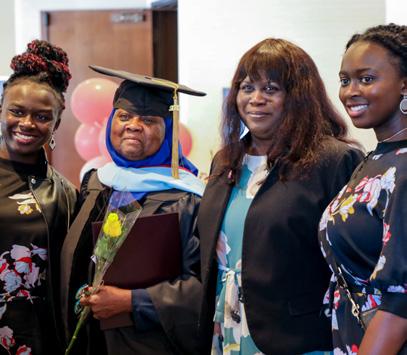




alumni.fielding.edu